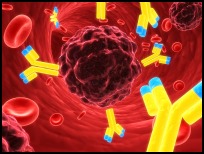Using Technology to Target Tumors
Unlike infectious diseases, which are caused by bacteria, viruses, and pathogens that invade the body from outside, cancers are diseases that come from within. Cancer occurs when the body’s own cells stop behaving the way they should, and this can make it a difficult disease to fight. In order to treat cancer safely and effectively, doctors need to figure out how to identify and kill tumor cells that are frequently not so different from the healthy cells surrounding them.
The immune system is extraordinarily effective at creating antibodies that target specific invaders – including the cancer cells that attack the body from within – something it does by rearranging a series of gene fragments to create an incredibly diverse number of targeting options. Over a lifetime of exposure to various illnesses, the system ends up creating a library of antibodies that have successfully targeted the causes of those diseases, antibodies which are maintained on alert for future infection. This library, created by the body’s own experimental machinery, can potentially be used to produce anti-cancer drugs more effectively focused than those born out of more orderly experimentation in the chemistry lab.
 That, at least, is the goal of Dr. Nicola Mason and her colleagues at the University of Pennsylvania who, with the support of the AKC Canine Health Foundation, have been trying to find new ways to use antibody fragments to target a particularly devastating type of canine tumor. They are looking for a more effective treatment for canine hemangiosarcoma – a highly aggressive cancer of the blood vessels which, with current chemotherapy, rarely has survival times of greater than six months. Their hope is that one day they may be able use antibodies from dogs with hemangiosarcoma to effectively target drugs at the tumors the cancer causes– killing the bad cells while leaving their healthy neighbors alone.
That, at least, is the goal of Dr. Nicola Mason and her colleagues at the University of Pennsylvania who, with the support of the AKC Canine Health Foundation, have been trying to find new ways to use antibody fragments to target a particularly devastating type of canine tumor. They are looking for a more effective treatment for canine hemangiosarcoma – a highly aggressive cancer of the blood vessels which, with current chemotherapy, rarely has survival times of greater than six months. Their hope is that one day they may be able use antibodies from dogs with hemangiosarcoma to effectively target drugs at the tumors the cancer causes– killing the bad cells while leaving their healthy neighbors alone.
Progress towards creating a successful cancer treatment comes in small steps, but the first one has already been taken. In 2010, Dr. Mason and her colleagues published a study showing that they were able to design special DNA templates, known as primers, which allowed them to make copies of the genes spelling out the contents of the antibody “libraries” of four dogs with hemangiosarcoma. The researchers then used bacteria to make copies of the antibody fragments encoded by the genes of one of those dogs and found that the fragments could be used to identify a virus – parvovirus – for which the dog had previously been vaccinated.
Although similar techniques have been shown to be effective at generating antibody fragments for humans, mice, and other species, this is the first study to show that the procedure works for dogs. Creating the antibody libraries may only be the first step in what is certain to be a long journey towards finding a treatment for canine hemangiosarcoma, but it is an exciting one. Hopefully somewhere in those genes is the code for an antibody that can be used to target the tumors caused by this devastating disease. This research gives scientists a much better chance of finding it.
This work was funded by AKC Canine Health Foundation Grant 1139.
Scientific publication:
Help Future Generations of Dogs
Participate in canine health research by providing samples or by enrolling in a clinical trial. Samples are needed from healthy dogs and dogs affected by specific diseases.



